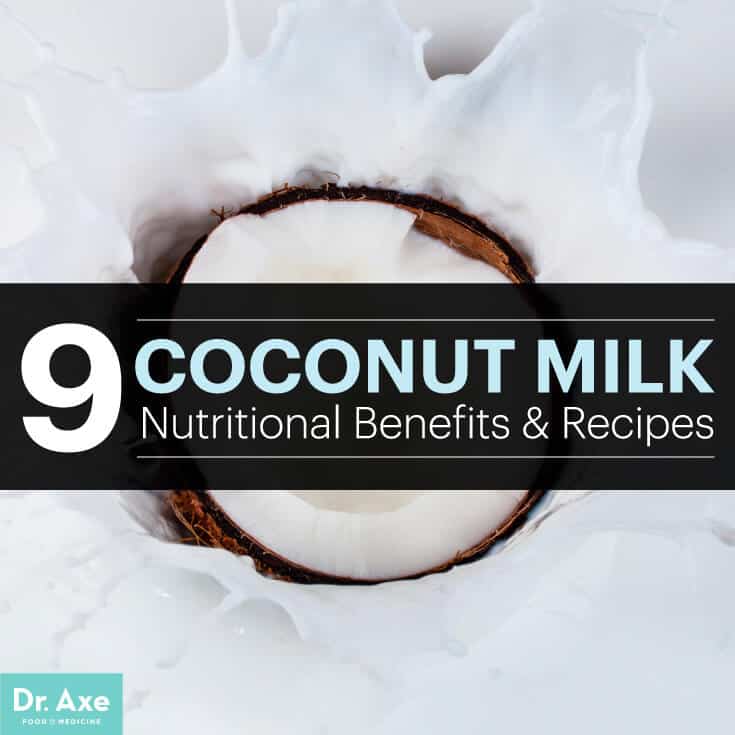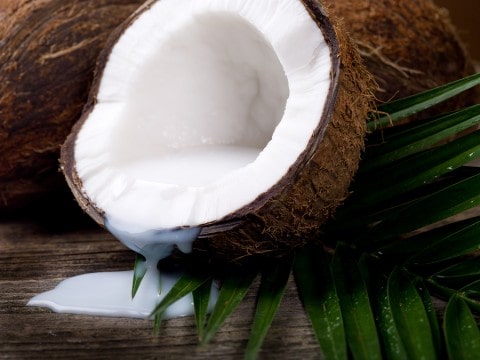Coconut Milk Nutrition — 9 Benefits + Recipes
With its creamy texture and slight natural sweetness,
coconut milk might taste like something that should be bad for you, yet it’s
anything but. Coconut milk is often considered a “miracle liquid” since coconut
milk nutrition offers great ability to build up the body’s immune defenses and
prevent disease. Coconut milk, along with it’s relatives coconut oil and
coconut water are among the world’s healthiest foods.
What exactly is coconut milk, and how is it made? Coconut
milk isn’t actually “milk” at all (in the sense that you normally think of it)
— it’s a liquid naturally found inside of mature coconuts, stored within
coconut “meat.” When you crack open a fresh coconut, the milky white substance
that leaks out is natural coconut water, but when you blend coconut meat and
then strain it, the result in a thicker coconut “milk.”
How do the two differ? As a coconut matures, more of the
water inside is replaced with coconut meat, so mature coconuts tend to be
better producers of coconut milk, while younger coconuts (around five–seven
months) are the best producers of coconut water. Coconut water is higher in
sugar and certain electrolytes, while coconut milk is higher in healthy
saturated fatty acids (from coconut oil) and calories.
Coconut Milk Nutrition Facts
In addition to providing nutrients and its awesome taste,
coconut milk contains beneficial fat called lauric acid, a medium-chain fatty
acid that’s easily absorbed and used by the body for energy. Coconuts’ fatty
acids are primarily saturated fats, but don’t think these will raise your
cholesterol levels and cause heart damage. Instead, they’re known to actually
do the opposite — coconut milk can help you lower cholesterol levels, improve
blood pressure, and prevent heart attacks or a stroke.
Since real, full-fat coconut milk is high in calories, it’s
better to have a smaller serving than you would of regular milk or coconut
water. About 1/4–1/2 cup at once is best, either as part of recipes (for
example as “coconut whipped cream”) or on its own combined with other flavors
(such as in a smoothie).
Full-fat coconut milk contains all of its natural fatty
acids, while “light” coconut milks are strained to remove some of the fat,
which creates a thinner, lower-calorie milk. Because coconut milk is completely
free from dairy, lactose, soy, nuts or grains, it’s a good option for anyone
allergic to dairy and nut- or grain-based milks, plus it’s vegan and good for
plant-based eaters.
A quarter cup of coconut milk (full-fat/not skimmed or light
milk) has about:
- 138 calories
- 1.5 grams protein
- 2 grams sugar
- 14 grams fat
- .55 milligrams manganese (27 percent DV)
- .15 milligrams copper (8 percent DV)
- 60 milligrams phosphorus (6 percent DV)
- 22 milligrams magnesium (5.5 percent DV)
- 3.9 milligrams iron (5.5 percent DV)
- 157 milligrams potassium (4.5 percent DV)
Health Benefits of Coconut Milk
1. Improves Heart Health by Lowering Blood Pressure and
Cholesterol
Coconuts are one of the best sources of lauric acid — 50
percent of the fat in coconuts is lauric acid, which has antibacterial and
antiviral activities. According to many studies, lauric acid is a protective
type of fatty acid linked with improved cholesterol levels and heart health.
For example, when 60 healthy volunteers were given coconut
milk porridge (CMP) for five days a week for eight weeks, researchers found
that their low density lipoprotein (LDL) levels decreased while their “good”
high density lipoprotein (HDL) levels rose significantly. They concluded that
“coconut fat in the form of coconut milk does not cause a detrimental effect on
the lipid profile in the general population, and in fact is beneficial due to
the decrease in LDL and rise in HDL cholesterol.”
Because coconuts contain minerals important for circulation
and controlling blood flow, coconut milk is also useful for lowering blood
pressure and keeping blood vessels flexible, elastic and free from plaque
buildup. For example, magnesium may help combat stress and muscle tension while
aiding in circulation and keeping muscles relaxed, important for preventing
heart attacks.
2. Builds Muscle and Helps Lose Fat
Studies find that medium-chain triglycerides (MCT) fatty
acids found in coconut milk increase energy expenditure and help enhance
physical performance. Following exercise, muscles also need plenty of nutrients
— including electrolytes like magnesium and potassium that are found in coconut
milk — to repair broken down tissue and grow back even stronger.
Because coconut milk is high in healthy fats, it also helps
fill you up and prevent overeating or snacking throughout the day, which derail
your efforts to improve your body composition.
3. Provides Electrolytes and Prevents Fatigue
Although coconut water is a higher source of electrolytes,
coconut milk also provides important minerals needed to maintain blood volume,
regulate heart health, and prevent dehydration or diarrhea. Especially in very
hot weather, following exercise or after being sick, electrolytes help prevent
exhaustion, heat strokes, heart problems, muscle aches or cramps, and low
immunity.
Coconut milk also contains the types of MCTs that are easily
used by your brain for energy, without even needing to be processed through
your digestive tract with bile acids like some other fats. Coconut milk’s
calories provide a quick and efficient source of healthy calories for the
brain, which is actually primarily made up of fat and relies on a steady stream
of it to function.
4. Helps Lose Weight
According to a study done by the School of Dietetics and
Human Nutrition at McGill University,
consumption of a diet rich in MCTs results in greater loss
of fat (adipose tissue) compared with long-chain fatty acids, perhaps due to
increased energy expenditure and fat oxidation observed with MCT intake. MCTs
may be considered as agents that aid in the prevention of obesity or
potentially stimulate weight loss.
As a food high in MCTs, coconut milk is a very filling,
fat-burning food. Fats provide the feeling of being full and satisfied and can
help prevent overeating, snacking, food cravings and potentially weight gain.
Of course, portion control is important considering the
calorie count of coconut milk, but as a part of a healthy diet it provides
necessary fatty acids in addition to other minerals that support weight loss
and detoxification. Coconut milk is also hydrating and helps the digestive
organs, like the liver and kidneys, function properly, which helps metabolize
fat and remove waste from the body.
5. Improves Digestion and Relieves Constipation
A well-hydrated digestive tract is important for preventing
or treating constipation. Coconut milk nourishes the digestive lining due
to its electrolytes and healthy fats, improving gut health and preventing
conditions like IBS.
6. Manages Blood Sugar and Controls Diabetes
The fat content of coconut milk can help slow the rate at
which sugar is released into the bloodstream, better controlling insulin levels
and preventing a “sugar high” or worse, conditions like diabetes. This is one
reason why coconut milk is especially good to add to sweetened recipes, like
desserts. Coconut milk’s MCTs are also a preferred source of energy for the
body rather than sugar.
7. Helps Prevent Anemia
Although the iron content of coconut milk isn’t very high,
it still provides a good source of plant-based iron that can contribute to a
diet sufficient at preventing anemia.
8. Prevents Joint Inflammation and Arthritis
Coconut milk’s MCTs can help lower inflammation, which is
associated with painful conditions like arthritis and general joint or muscle
aches and pains. Coconut milk in place of refined sugar especially is helpful
for people with arthritis (or other autoimmune conditions) because sugar is a
pro-inflammatory and linked to low immunity, worsened pain and swelling.
9. Prevents Ulcers
Another benefit of coconut milk nutrition that may surprise
you? Researchers found that coconut milk can help reduce the occurrence of
ulcers even better than coconut water. When rats with ulcers were given coconut
milk, they experienced a reduction in the size of ulcers of about 56 percent. The study found that coconut milk
had protective effects on the ulcerated gastric mucus that can lead to painful
ulcers.









